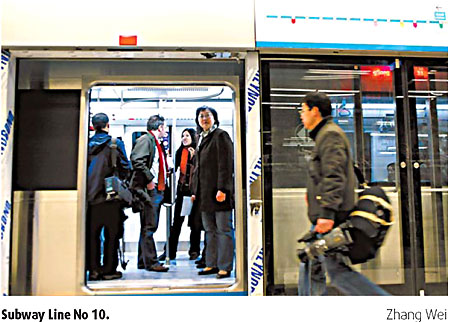In a bid to ease heavy traffic on the opening and closing days of the Olympic Games, Beijing's subway system will operate around the clock for the first time, the Beijing metro operation company announced last week.

It is estimated that more than 100,000 people will flock to the National Stadium on Aug 8, the opening day of the 2008 Beijing Games, including some 80,000 spectators and another 20,000 working staff, thus putting unprecedented pressure on public transportation near the central venue, also known as the Bird's Nest.
The subway is expected to be overloaded on both Aug 8 and 24, as the newly constructed subway line 10 and the Olympic brand line go through Olympic Park, where the Bird's Nest is located. Both lines are undergoing engineering trials and will be opened by the end of June.
Besides the 24-hour-service, subway line 10 will shorten train intervals to three minutes during the ceremonies to ensure the quick and smooth transit of spectators, a company representative told Beijing Daily last week.
The subway will also extend its operating hours on the other days of the Games, and Olympic Games ticket holders may get free rides on dedicated trains with Games staff and volunteers, he added.
The move follows a slew of traffic management measures announced by the government earlier to lighten traffic and reduce air pollution in the capital. Other measures include dedicated traffic lanes on the roads and a partial car ban that will go into effect about a week before the athletes' village opens.
Some key bus routes will also run around the clock and 1,000 new buses have been purchased to enlarge the city's transportation capacity.
As the car ban will keep about one-third, or 1.3 million, vehicles off the road, the promise of free buses and subways for Olympic participants is seen as a form of compensation for those who will not be able to drive their cars to watch the Games.
Beijing's new moves may have a ripple effect on other Olympic co-host cities. Tianjin, host of some of the soccer preliminaries, will also impose a partial car ban a few days before kickoff.
Meanwhile in Shenyang, 12 special routes bound for Olympic venues have been equipped with 360 buses to ensure that at any time there is an average passenger capacity of no less than 40,000 people. In addition, 40 routes will operate past midnight during the Games.